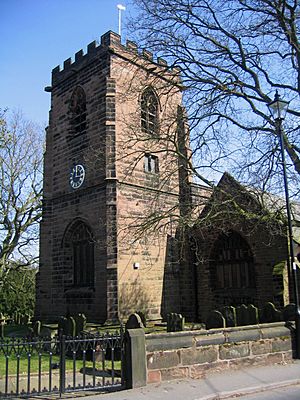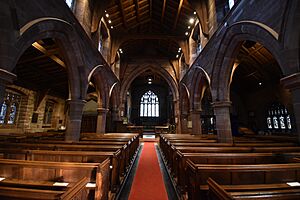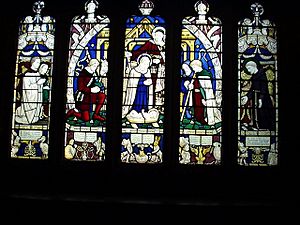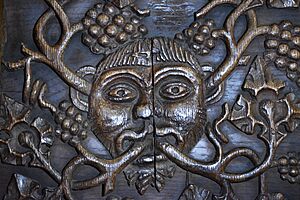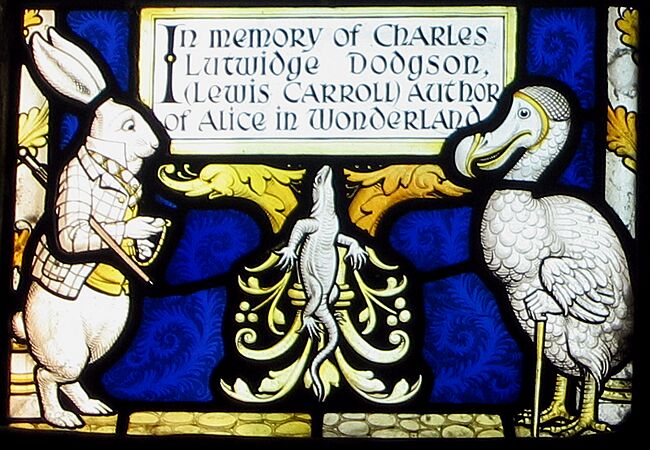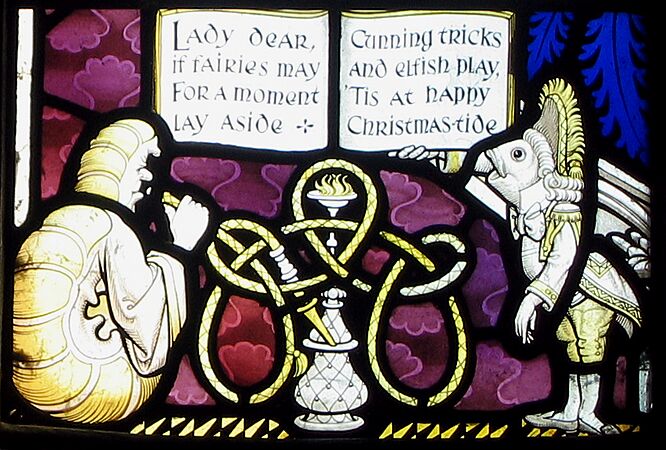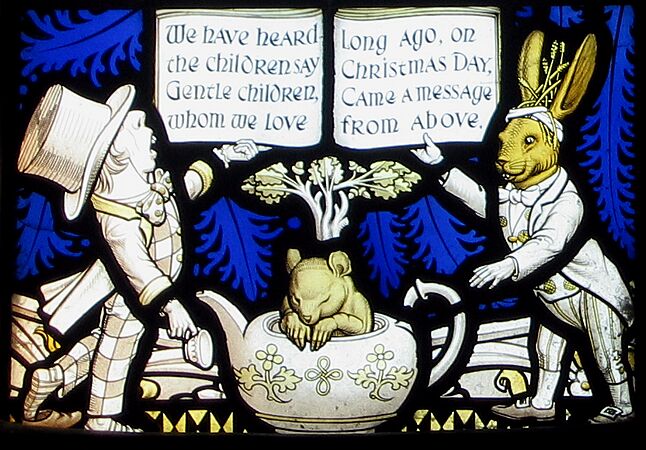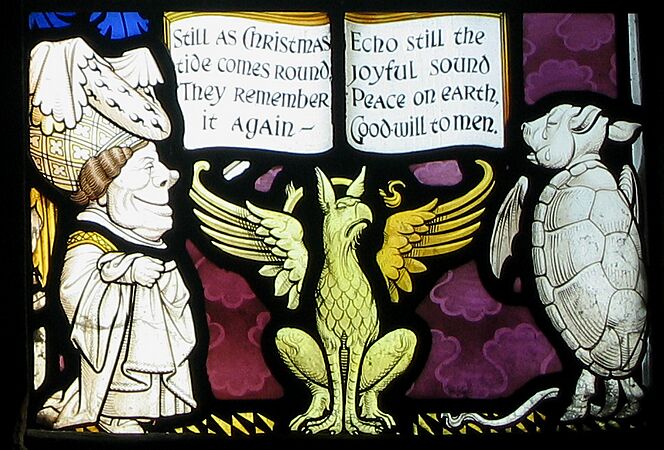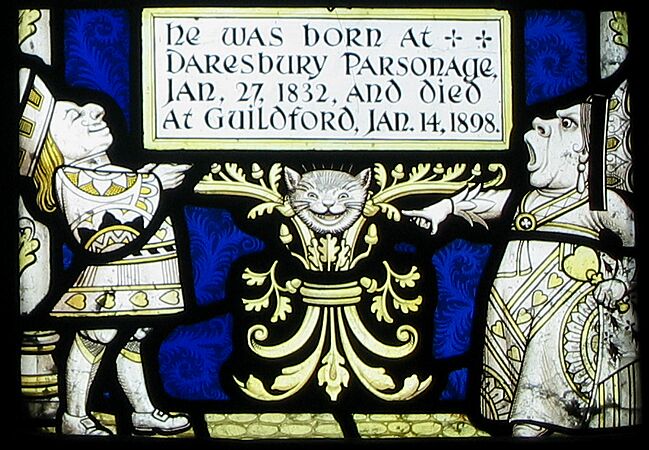All Saints' Church, Daresbury facts for kids
Quick facts for kids All Saints' Church, Daresbury |
|
|---|---|
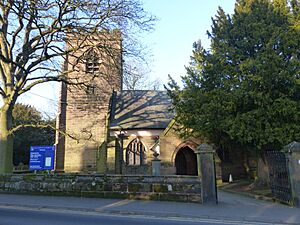
All Saints' Church from the south
|
|
| Lua error in Module:Location_map at line 420: attempt to index field 'wikibase' (a nil value). | |
| OS grid reference | SJ 580,828 |
| Location | Daresbury, Cheshire |
| Country | England |
| Denomination | Church of England |
| Churchmanship | Liberal Catholic |
| History | |
| Status | Parish church |
| Architecture | |
| Functional status | Active |
| Heritage designation | Grade II* |
| Designated | 8 January 1970 |
| Architect(s) | Paley and Austin |
| Architectural type | Church |
| Style | Gothic, Gothic Revival |
| Completed | 1872 |
| Specifications | |
| Materials | Red sandstone, slate roof |
| Administration | |
| Parish | All Saints, Daresbury |
| Deanery | Great Budworth |
| Archdeaconry | Chester |
| Diocese | Chester |
| Province | York |
All Saints' Church is a historic church located in the village of Daresbury, Cheshire, England. It is famous for its special connection to Lewis Carroll, the author of Alice's Adventures in Wonderland. The church has beautiful stained glass windows that show characters from his beloved book.
This church is recognized as a very important building, listed as Grade II* on the National Heritage List for England. It is an active Church of England parish church. Lewis Carroll, whose real name was Charles Dodgson, was born in the vicarage (the church house) in Daresbury in 1832. His father was a priest at the church. In March 2012, the Lewis Carroll Centre, a special building connected to the church, was opened to celebrate his life and work.
Contents
History of All Saints' Church
In the 12th century, a small chapel was built on the site of the current church. It was like a smaller branch of a bigger church nearby, Norton Priory. This chapel was part of the Runcorn parish. After the Reformation, a big change in the church, the control of the Runcorn parish went to Christ Church, Oxford. The stone tower of the church was probably built around this time. Over many years, there were often disagreements about money between the people of Daresbury and the main church in Runcorn.
Most of the church, except for the tower, was rebuilt between 1870 and 1872. This work was done by architects named Paley and Austin from Lancaster. They made the church longer, added a new porch on the north side, and a room for the clergy (vestry). This rebuilding cost about £6,000 at the time, which would be a huge amount of money today! Sadly, during this rebuilding, an old wooden screen and loft inside the church were removed. Daresbury became its own separate parish in February 1880. The tower was also repaired in 1872 by Sir Gilbert Greenall, 1st Baronet.
Church Architecture and Design
Outside the Church
The church is built from red sandstone and has a slate roof. The style of the church building is called Perpendicular Gothic, which means it has tall, thin windows and strong vertical lines. The church has a long main area called a nave with side sections called aisles. There is a tower at the west end of the nave. The tower has strong supports called buttresses at its corners and a decorative top edge called crenellation. On top of the tower, there is a weather vane shaped like a fish.
The large window on the west side of the tower is simple with four sections. The windows where the bells are (belfry windows) are also simple with two sections. You can see the date 1110 carved on the south side, but experts believe it was originally 1550 and the numbers wore away over time. At the east end of the south aisle, there is a special area called the Daniell Chapel. This chapel was renamed to honor the Daniell family, an old family from Cheshire with strong ties to Daresbury.
Inside the Church
Inside, the arches are supported by simple eight-sided columns. The pulpit, where the priest gives sermons, is very old, from the Jacobean period. It has detailed carvings of angels' heads. There is also a carving that looks like the griffin from Alice's Adventures in Wonderland. The font, used for baptisms, is from the 19th century. Its fancy wooden cover was a gift from Lady Greenall.
Behind the altar, you can see a carving of a "green man" on a reused Jacobean screen. This is a face made of leaves, often found in old churches. The ends of the oak benches have interesting carved designs. In the bell tower, there is a board with a poem where the first letter of each line spells out "Daresbury."
Stained Glass Windows
The stained glass windows in the south aisle show eleven of the apostles (Jesus's closest followers, without Judas Iscariot). These were given to the church in the mid-19th century by the Stubbs family.
The most famous window is in the Daniell Chapel. It features characters from Alice's Adventures in Wonderland! This window was put in place in 1935 to celebrate 100 years since Lewis Carroll's birth. It was designed by Geoffrey Webb. The top parts of the window show a nativity scene with angels. On the left, you can see Lewis Carroll himself with Alice Liddell, the girl who inspired Alice.
The window also includes symbols related to Carroll's life, like the Cheshire wheatsheaf, the symbols of Rugby School and Christ Church, Oxford (where he studied), and even mathematical tools. Along the bottom of the window are five panels with characters from the Alice books, like the White Rabbit and the Mad Hatter. These characters are based on the famous drawings by John Tenniel. The window also includes words from Carroll's poem Christmas Greetings. On the south wall, there are other windows designed by Trena Cox that show The Flight into Egypt and The Annunciation. These were given in 1960 to remember the Broome family.
Memorials and Other Features
On the south wall, there is a memorial by John Gibson that was moved from the old church. It remembers Sarah Byrom, who passed away in 1833. Other memorials in the church remember people like Radulphus Starkie from the 17th century and Rebecca Rutter from 1725. There is also a memorial to Henry Byrom, who died in 1804.
In the chancel (the area near the altar), there is a memorial to George Heron, a priest from Chester Cathedral who baptized Lewis Carroll. You can also find two brass plaques for members of the Greenall family who died in 1861 and 1867. The Daniell chapel has memorials for the Chadwick family.
The church organ has two keyboards and was built by Jardine. It was repaired in 2002. The church has a set of eight bells, all made in 1913. The church records, called parish registers, go all the way back to 1617.
Outside the Church Building
In the churchyard, there is a 16th-century font where Lewis Carroll and many others were baptized. The churchyard also contains the graves of two soldiers and a Royal Navy schoolmaster who died in World War I.
Lewis Carroll Centre
The Lewis Carroll Centre is a modern, curved sandstone building attached to the north side of the church. It has tall windows and you enter it through the church's north door. Inside, there are displays with information about Charles Dodgson (Lewis Carroll), his family, and his life. A special bell hangs in the room; it used to call canal boat people to worship at a floating church nearby. The centre is also used as a meeting place for schools and other groups. Both the church and the centre are open every day, and there is no charge to visit.
Gallery
Panels depicting characters from Alice
See also
- Grade I and II* listed buildings in Halton (borough)
- Listed buildings in Runcorn (rural area)
- List of ecclesiastical works by Paley and Austin


